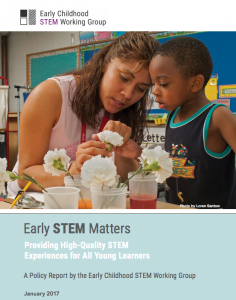Supporting STEM Learning for Young Children
 A new report by a group of early childhood leaders offers a series of guiding principles and recommendations on ways to take action to support high-quality STEM education and experiences for young children. The report, “Early STEM Matters: Providing High-Quality STEM Experiences for All Young Learners,” is the culmination of two years of work by the Early Childhood STEM Working Group, which was co-organized by Erikson Institute and UChicago STEM Education at the University of Chicago.
A new report by a group of early childhood leaders offers a series of guiding principles and recommendations on ways to take action to support high-quality STEM education and experiences for young children. The report, “Early STEM Matters: Providing High-Quality STEM Experiences for All Young Learners,” is the culmination of two years of work by the Early Childhood STEM Working Group, which was co-organized by Erikson Institute and UChicago STEM Education at the University of Chicago.
The group identified these guiding principles:
- Adult supervision is necessary to help guide children through their STEM experiences and support their natural curiosity.
- Discussion and visual representation, such as drawing and writing, must be a part of STEM education.
- Building adults’ confidence in STEM concepts is important to shaping children’s own attitudes toward STEM.
- Culture, race, and socio-economic status influence children’s STEM experiences.
The guiding principles informed the six recommendations of the group to improve STEM education in early childhood classrooms, including
- Through advocacy and messaging, raise awareness about the importance of access to high-quality STEM education for all children.
- Improve STEM-related teacher preparation and ongoing professional development.
- Involve parents in their children’s STEM experiences by offering initiatives and resources that encourage their participation outside the classroom.
- Develop resources and offer guidance to support educators’ efforts to implement STEM experiences in the classroom.
- Make sure that educational standards at the state level explicitly address STEM disciplines.
- Establish a long-term research agenda to shape ongoing support for and development of early childhood STEM education.
Read the full report here: Early STEM Matters